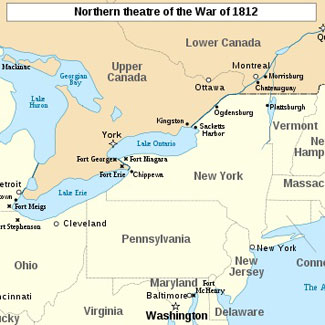Conquering another country is rarely a simple matter of parading soldiers through it. Why would Thomas Jefferson, and so many other Republican officials, believe the conquest of Canada could be achieved so easily?
“The acquisition of Canada this year, as far as the neighborhood of Quebec, will be a mere matter of marching; & will give us experience for the attack of Halifax the next, & the final expulsion of England from the American continent.” Thomas Jefferson to William Duane, 4 August 1812

Semhur and P.S. Burton, via Wikimedia Commons
Thomas Jefferson could be extremely overconfident. In August 1812, the former President boasted to the editor of a Philadelphia newspaper that “the acquisition of Canada …will be a mere matter of marching.”
Jefferson and other optimists overlooked a number of realities. One was the physical vastness, rugged terrain, and unforgiving weather of Canada. Those obstacles presented a number of significant challenges to would-be invaders—a lesson Americans had observed first-hand as they watched British invaders struggle during their own War of Independence.
Jefferson also overestimated the readiness of the American armies. Optimists assumed that the U.S. army could be effective as an invading and occupying force. In truth, the army in 1812 was oriented to the defense of the nation, and ill-prepared to mount offensive expeditions. Jefferson had not helped matters during his own presidency, reducing the military establishment, and dismissing a number of competent officers with Federalist sympathies.
Jefferson also misjudged the effectiveness of the British army. Their own success fighting and defeating the British redcoats during their War of Independence proved a deceptive lesson. Unlike the British troops Americans faced during the Revolution, the British army that arrived in Canada was better led and battle-hardened by twenty years of experience fighting against Napoleonic France. Although Jefferson anticipated further ease at conquering Canada because of the distraction the Napoleonic Wars provided, this, too, proved a miscalculation.
Finally, many Americans assumed that the Canadian population would welcome the arrival of American forces. In reality, the inhabitants of Canada—a mix of French settlers, American loyalists who had fled north during the War of Independence, and a growing population of ambivalent American transplants - had little reason to embrace an incursion from the south.
Jefferson’s assessment proved wrong on just about every count. Americans went to war based on faulty assumptions about Canadian geography, weather, the fitness of its ground forces, and the attitudes of the Canadian population toward “liberation.” Jefferson worked to drum up support for the invasion through correspondence with key members of the press, and managed to spread his over confidence to the larger public. Those efforts positioned the for a rude awakening as the reality of war sank in and American fortunes slipped.
Last updated: May 24, 2016
